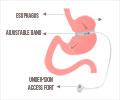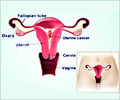Weight loss (bariatric) surgery can help reduce the risk of womb cancer in obese women, reveals a new study.

‘Can weight loss surgery prevent womb cancer? Yes, weight loss surgery (bariatric surgery) can lower womb cancer risk in obese women, reveals a new study.’
Read More..




Doctors have long known that womb cancer is caused by obesity, however, until now, the effect of losing weight on precancerous changes in the womb has been poorly studied.Read More..
The research led by University of Manchester and Salford Royal scientists is published in International Journal of Cancer and funded by the NIHR Manchester Biological Research Centre.
Around 9,000 women a year are diagnosed with womb cancer, and 2,300 women die.
Pre-menopausal women treated for womb cancer by surgery lose the ability to have children.
The 72 women with an average BMI of over 50 - considered to be super obese - had biopsies taken from their wombs during gastric sleeve or bypass surgery.
Advertisement
Of the six women with endometrial hyperplasia, three had no signs of the condition when re-tested at eight weeks, after losing around three stone in weight.
Advertisement
Six monthly checks over four years revealed the precancerous tissue did not return for these five women; the last had a hysterectomy.
The remaining 62 women had normal womb tissue at the time of weight loss surgery, but it was high risk for an abnormality, with fast-growing cells, cancer-causing pathways switched on, and cancer-stopping pathways switched off.
By twelve months after surgery, when the women had lost around seven stone in weight, the high risk changes had reversed.
Dr Emma Crosbie, Clinical Senior Lecturer from The University of Manchester, led the study.
She said: "We know that super obese women are at much higher risk of womb cancer than normal-weight women.
"But we didn't expect such a high proportion of women having treatment for their obesity to have womb cancer and pre-cancer they didn't know about.
"Thanks to this study, we now know that helping obese women to lose weight can reverse pre-cancerous tissue changes.
"It's clear that for super obese women, quick access to weight loss surgery has benefits beyond improving diabetes and risk of heart disease. It can also reduce womb cancer risk.
"Losing weight through dieting is also likely to be effective, but we know that dieting is very hard to do and weight lost is often regained."
Obese postmenopausal women produce estrogen from their fat stores. But as they no longer ovulate, the lack of progesterone allows the cells in the womb to grow - which increases the risk of cancer.
Inflammatory responses and Insulin production are also changed in obese women and can cause cells in the womb to grow.
"Because the reversal of precancerous changes in the womb was so quick, we think the metabolic consequences of weight loss surgery was crucial," Explained Dr. Crosbie.
She added: "Not that weight loss surgery is an easy choice. It changes your relationship with food forever, as you'll be eating smaller meals more frequently, and it is important to remember that surgery can be a hazardous procedure.
"That's why it's not for everyone: only about a third of women choose the surgical option.
"But for those that choose it, gastric sleeve or bypass surgery can now be seen as a preventative measure for womb cancer. Indeed, Dr. Akheel Syed at Salford Royal is already doing this thanks to the results of our study.
"Many patients wait up to two years before their surgery. But making the process quicker - as Dr. Akheel Syed is doing -will undoubtedly save lives."
Source-Eurekalert















